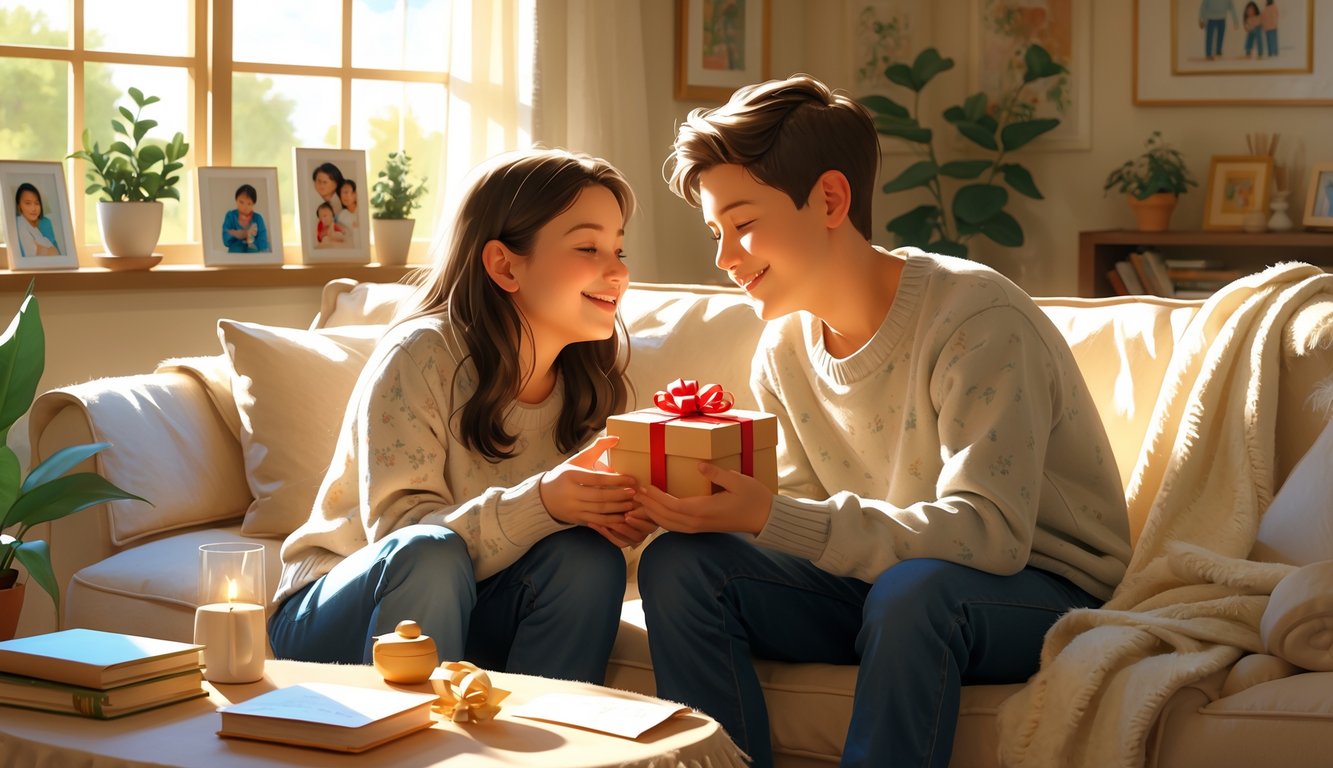
The One Gift That Forges Lifelong Sibling Bonds
Here’s what keeps coming up: it’s never the designer gadget, never the scrapbook. Siblings—especially the ones who know every embarrassing meltdown—always say it’s shared time. Awkward hobbies, dumb road trips, stuff you can’t even explain. That’s what turns “Yeah, I have a brother” into “He’s my emergency contact.” Emotional connection is messy.
Choosing an Experience Over a Physical Item
Waiting out a train delay in socks and shared earbuds, I realized I can’t remember last year’s birthday gift but I know every joke from that trip. People really underestimate how much a planned experience—skydiving, whatever—outlasts a scarf. University of Toronto found 72% of siblings say shared experiences improved their bond; only 13% credited a physical gift.
A fancy dinner becomes a running joke about raw risotto. That’s better than the latest phone. Why does gifting a “together” memory always end with someone forgetting the waiver? Losing the certificate is the story. Psychologists say experiential gifts stick in your brain because you don’t re-gift memories.
Quality Time and Shared Hobbies
Don’t get me started on forced family game night. But then, my brother and I get competitive over a 1000-piece puzzle, and suddenly it’s a thing. No hoodie ever did that. Turns out, lingering—hours spent on something you both kind of hate—builds trust. Watching someone cheat at Uno, there’s nothing like it.
Best sibling stories come from boredom: ugly baking disasters, chess with a cat knocking over pieces. Studies say siblings who share hobbies have 38% higher life satisfaction. I wouldn’t believe it if I hadn’t read it in a 2021 journal. This isn’t Hallmark stuff. It’s just… life. Quality time means inside jokes, eye-rolls, and knowing exactly who finished the ice cream.
Stories from Brothers and Sisters
Okay, so last year a friend goes, “My biggest sibling memory isn’t some fancy trip, it’s fighting over shotgun on a pointless summer drive.” I laughed, but then I started asking people, and literally everyone had a story—never about gifts or tablets, always about some shared disaster. Like this guy who swears he and his brother got lost hiking because they “trusted the goat.” No idea what that means, but now their sibling group chat is called “Goat GPS.” That’s the kind of stuff that sticks.
I skimmed a bunch of those cheesy sibling quote roundups—it’s always the same: late-night talks, getting grounded, that one birthday party where everyone wanted to disappear. Sibling bonds? Built through chaos, not Hallmark moments. It’s messy, sometimes loud, and, honestly, those are the stories you end up telling. Not the “perfect” gift. That stuff fades. The weird memories? Permanent.
Creating Positive Sibling Traditions

It’s wild how every family gathering turns into a rerun—someone’s obsessed with planning food, someone else brings up the year we lost a shoe at a rest stop, and nobody agrees on snacks. I’ve seen a single board game or some ridiculous scavenger hunt totally flip the sibling vibe from “I hate you” to “fine, I’ll help you find the last clue.” And, yeah, someone always eats the last chip. Every time.
Holiday Traditions and Family Vacations
Thanksgiving? Guaranteed argument about who sits where, and for some reason, it’s weirdly comforting. Families keep repeating these dumb little things—like hanging up the ugliest ornament or making cinnamon rolls (store-bought is fine, fight me)—and somehow, that’s what gets remembered.
Supposedly, the “science” says rituals are emotional superglue. Harvard Health claims the rhythm of family traditions stabilizes kids and predicts emotional strength later. Maybe? I mean, during family trips—total chaos, lost hotel keys, snack wrappers everywhere—nobody acts like a saint, but years later, those messes become the best stories. Family traditions kind of morph into this weird sense of identity and togetherness for siblings. Even if it’s not Instagram-worthy, you start craving the same old chaos.
Game Nights and Board Games
Honestly, does anyone actually enjoy Monopoly, or is it just a two-hour excuse to argue and laugh? Game night’s never really about winning. Well, except when it is. It’s about that one inside joke from, like, 2011 that refuses to die. Board games force everyone to pay attention, and Dr. Shelly Montag (who, for the record, hates being the banker) says it sparks “shared regulatory laughter.” Whatever that means, but apparently, it helps kids learn to lose and get teased.
I keep a mental list of games that won’t destroy the living room: Codenames, Sushi Go!, Spot It, Uno—easy stuff, so even the little ones can play. If you keep switching games, older siblings teach the rules, younger ones make up new ones that barely make sense. That’s bonding, apparently. Game nights somehow give siblings this practice in not hating each other. And you don’t even need a board—last Thanksgiving, we played charades but only animal noises. Weirdly fun.
Outdoor Adventures and Exploring Nature
Let’s be real, not every sibling wants to wake up at sunrise for a hike. But there’s something about two kids arguing over who gets the “wizard staff” stick, then using mud as currency. Dr. Ramon James (who, fun fact, is terrified of bees) keeps saying that unstructured time outside builds empathy and resilience. Actual research, not just nostalgia.
My advice? Let kids decide what counts as an “adventure.” Sometimes a two-mile “nature walk” turns into a pinecone scavenger hunt that ends at the neighbor’s hose. Someone falls in a creek, someone else screams about a spider, and everyone winds up covered in grass stains. Siblings who get into this stuff together connect in ways that just don’t happen indoors. Letting siblings explore outside together gives them stories that stick. Give them bug spray and old boots. Snacks? Double up, or watch the world burn.